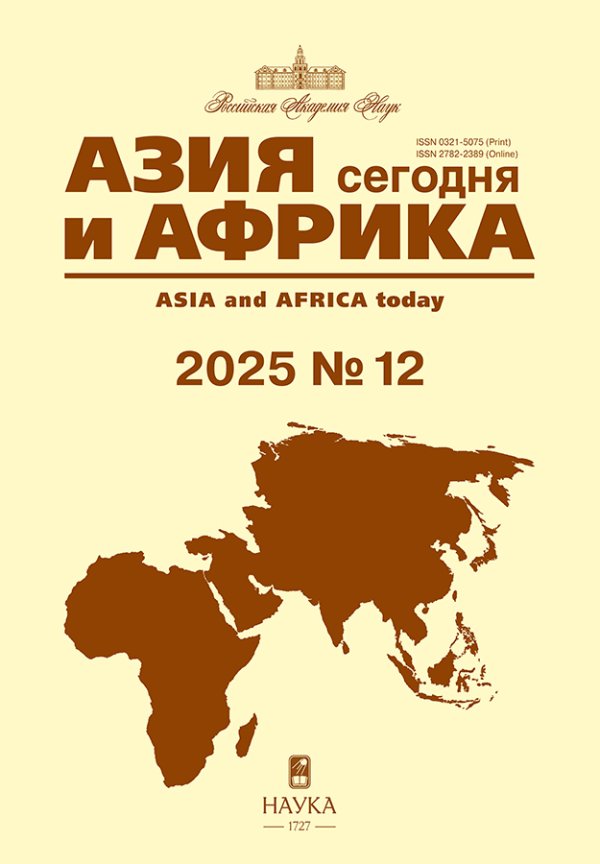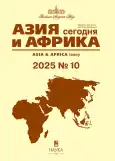No 10 (2025)
Politics, economics
Africa in the Fight Against Neocolonialism and the Legacy of Colonialism
Abstract
Despite the official declaration of independence many decades ago, African countries continue to feel the control over their politics and economy by the former metropolises, which pursue neocolonial policies that preserve their dependent position in the system of international relations. The peoples of Africa, organized by opinion leaders, are waging a decisive struggle against it, which is also activating the anti-colonial agenda of African politicians. Its main points are the demand for compensation for the numerous crimes against Africans and the payment of reparations to them. Initially the Organization of African Unity and currently the African Union that replaced it have coordinated these activities. The UN has become the main international platform for the fight against the legacy of colonialism and neocolonialism, having formed the corresponding infrastructure and regulatory framework. Russia's support for this struggle of the African peoples is enshrined in its modern Foreign Policy Concept. However, the former colonial powers are seeking to avoid historical responsibility and the payment of reparations.
Asia and Africa Today. 2025;(10):5-13
 5-13
5-13


Trade and Economic Cooperation Between Russia and Cambodia: Trends and Prospects
Abstract
The article presents a comprehensive analysis of trade and economic cooperation between Russia and Cambodia in the context of modern global transformations, including the restructuring of international supply chains, sanctions pressure on Russia and the strengthening of the role of ASEAN. The relevance of the study is highlighted by Cambodia's desire to diversify economic ties and the country's potential as a partner of Russia. The purpose of the work is to identify trends, potential and structural limitations of bilateral cooperation. Special attention is paid to new growth drivers, including negotiations on a free trade agreement (FTA) with the Eurasian Economic Union, the expansion of supplies of Cambodian agricultural products (mango, rice, pepper) to the Russian market, as well as prospects for cooperation in energy and infrastructure projects. The key findings indicate a positive trend in trade, however, its volume remains insignificant against the background of Cambodia's large-scale cooperation with China. Development prospects are associated with the implementation of the FTA, niche specialization in agricultural exports, tourism and digitalization, as well as strategic projects such as the creation of "smart" agricultural clusters.
Asia and Africa Today. 2025;(10):14-20
 14-20
14-20


Public and Private Sector in India's Military-Industrial Complex
Abstract
The role and forms of participation of private and state-owned companies in defense production in India, as well as the peculiarities of India's procurement of arms and military equipment (AME), have undergone significant changes several times since the country gained independence in 1947. The article highlights the key stages of the corresponding transformations in India – from the model of combining private and public defense sector companies in the 1940–1950s, to the consolidation of defense capacities in the hands of the state (state-owned companies) in the 1960–1980s, and further to reverse transition in the 2000s towards the "opening" of the military-industrial complex for the private sector. The reasons that led the Indian government to liberalize defense-industrial policy and open the defense complex to private and foreign investment in the early 2000s were analyzed. Estimates of the effectiveness of projects for the development and production of key combat systems by state-owned companies in India in the absence of competition from the private sector are also given.
Asia and Africa Today. 2025;(10):21-29
 21-29
21-29


Some Aspects of Assistance from the UAE, Saudi Arabia and Russia to African Countries
Abstract
This article presents a comparative analysis of the motives, mechanisms, and effectiveness of Official Development Assistance (ODA) provided to African countries by three non-Western donors increasing their influence on the continent: the United Arab Emirates (UAE), the Kingdom of Saudi Arabia (KSA), and Russia. The study's relevance stems from Africa's acute development challenges, political instability, and climate risks, generating a need for external support to achieve Sustainable Development Goals (SDGs). The theoretical framework integrates the concept of ODA and securitization theory, applied to interpret aid motives through a security lens. The methodology employs comparative analysis of ODA data, reports from national funds, and international organizations. The scientific novelty lies in the comparative assessment of the three donors' current strategies. The authors conclude that while ODA contributes to addressing African challenges, the donor states pursue their own geopolitical and economic interests, utilizing aid as a soft power instrument, with significant variations in their underlying motivations and priorities.
Asia and Africa Today. 2025;(10):30-39
 30-39
30-39


Notes of an orientalist
Business Communication in Arab Countries: Guidelines for Russian Entrepreneurs
Abstract
The article examines the distinctive features of business communication in Arab countries, focusing on the interplay of cultural, religious, and social factors that shape negotiation practices and organizational interaction. Particular attention is given to the role of Islamic ethics in structuring business behavior. A central aspect of the analysis is the phenomenon of wasta, which in Arab societies functions as a mechanism for establishing trust and access. The paper also explores verbal and non-verbal communication patterns as well as the enduring importance of genderbased restrictions. These cultural dimensions are further examined in the context of digital communication, where traditional codes of etiquette and confidentiality remain influential. Drawing on academic studies and author's personal experience, the article formulates practical recommendations for entrepreneurs. It concludes that cultural adaptability, reliance on intermediaries, and respect for Islamic ethical frameworks are strategic necessities. Business success in the region is determined by the ability to establish trust and navigate the symbolic order of Arab societies.
Asia and Africa Today. 2025;(10):40-50
 40-50
40-50


Post-graduate tribune
Aggregated Debt at the Modern Stage of the PRC's Economic Development: Analysis of Key Factors and Risks
Abstract
This article analyzes the debt of the China's economy by segments that accumulate it: households, the corporate non-financial sector, and central and local governments. The article also shows the dynamics of debts to GDP ratios starting from 2018, in regards of external shocks and China's internal economic policy, as well as in comparison with other countries. China is in the Top-10 countries in terms of debt to GDP ratio, and ahead of all developing countries. The main borrower is the non-financial corporate sector, followed by provincial governments, if special local government financing vehicles (LGFV) are included, and households. The increase in households' debt helps to stimulate China's internal consumption, important for the economy's transformation. At the same time, high interest payments may have the opposite effect. The increase in the corporate non-financial sector's debt has already caused major bankruptcies and tightening of such borrowings' regulation. Most risks are seen in regard to the local governments' debt, as it is caused by systematic issues related to the budget control.
Asia and Africa Today. 2025;(10):51-60
 51-60
51-60


Protectionism in the Agricultural Sector of North Africa: Economic Benefits and Risks
Abstract
The article analyzes the benefits and risks of protectionism in the agricultural sector of North African countries. The study employs statistical analysis, the balance method, and comparative analysis to assess the effects of protectionism policies in Egypt, Algeria, Morocco and Tunisia. It examines theoretical foundations, key protectionism instruments, and perspectives from both advocates and critics. The findings show that the most effective approaches combine tariff and non-tariff measures with investment in agricultural modernization and farmer support. For instance, Morocco's integrated policies under the Green Morocco Plan significantly increased exports and productivity. However, the study also highlights risks associated with long-term protectionism, such as reduced competitiveness, corruption, and rising consumer prices. The conclusion emphasizes that protectionism measures can contribute to sustainable agricultural development if applied temporarily and targetedly, alongside institutional reforms.
Asia and Africa Today. 2025;(10):61-69
 61-69
61-69


Pages of history
First Ladies in Socio-Political Life of Egypt and Tunisia (1981–2011)
Abstract
The examples of Egypt and Tunisia during the time in office of Presidents Hosni Mubarak and Ben Ali showed that the absence of clear boundaries of the functions of first ladies that are understood and accepted by society can become one of the reasons for the destabilization of the domestic political situation. In Egypt, First Lady Suzanne Mubarak's influence on domestic and foreign policy had been growing steadily since the late 1980s and reached its peak in the 2000s. By the end of Hosni Mubarak's rule, who had noticeably withdrawn from governing the state due to his illness, his wife had effectively become a rival president or co-president. This caused increasing discontent with the regime among various strata of Egyptian society, mainly among its politically active part, the political elite, and the security forces, including high-level military brass. In early 2011, large-scale popular protests – the Arab Spring – led to a change of power. Leila Trabelsi's (Tunisia) exit far beyond the framework – if not generally recognized, then at least ingrained in the consciousness of a large part of society – of the functions of the first lady, and that against the backdrop of the doings of the corrupt Ben Ali – Trabelsi family clan, also affected negatively the stability of power and led to the overthrow of a substantially incapacitated president.
Asia and Africa Today. 2025;(10):70-79
 70-79
70-79


Traditions, manners, customs
Bengali Durga Puja: Preserving Traditional Values
Abstract
The article deals with the study of Bengali Durga Puja, one of the largest Hindu festivals. The authors analyze it as a complex cultural phenomenon that combines ancient traditions and modern interpretations. Special attention is paid to the mythological image of Durga, her role in the Hindu pantheon and the symbolic significance of the festival for Bengali culture. The historical roots of Durga Puja, its evolution from aristocratic ceremonies to public celebrations are considered. The authors describe in detail the rituals and traditions associated with the festival, including the creation of temporary pavilions (pandals) and clay images of the goddess. The study focuses on modern trends in the celebration of Durga Puja in Kolkata, when the area adjacent to the pandals is decorated, and not only artisans but also artists who combine traditional and innovative approaches while working on the creation of pavilions. The authors highlight the importance of Durga Puja as a symbol of cultural identity and its role in preserving traditions in the context of globalization. Its influence on contemporary art and environmental initiatives is also discussed, reflecting the adaptation of rituals to modern realities.
Asia and Africa Today. 2025;(10):80-86
 80-86
80-86













